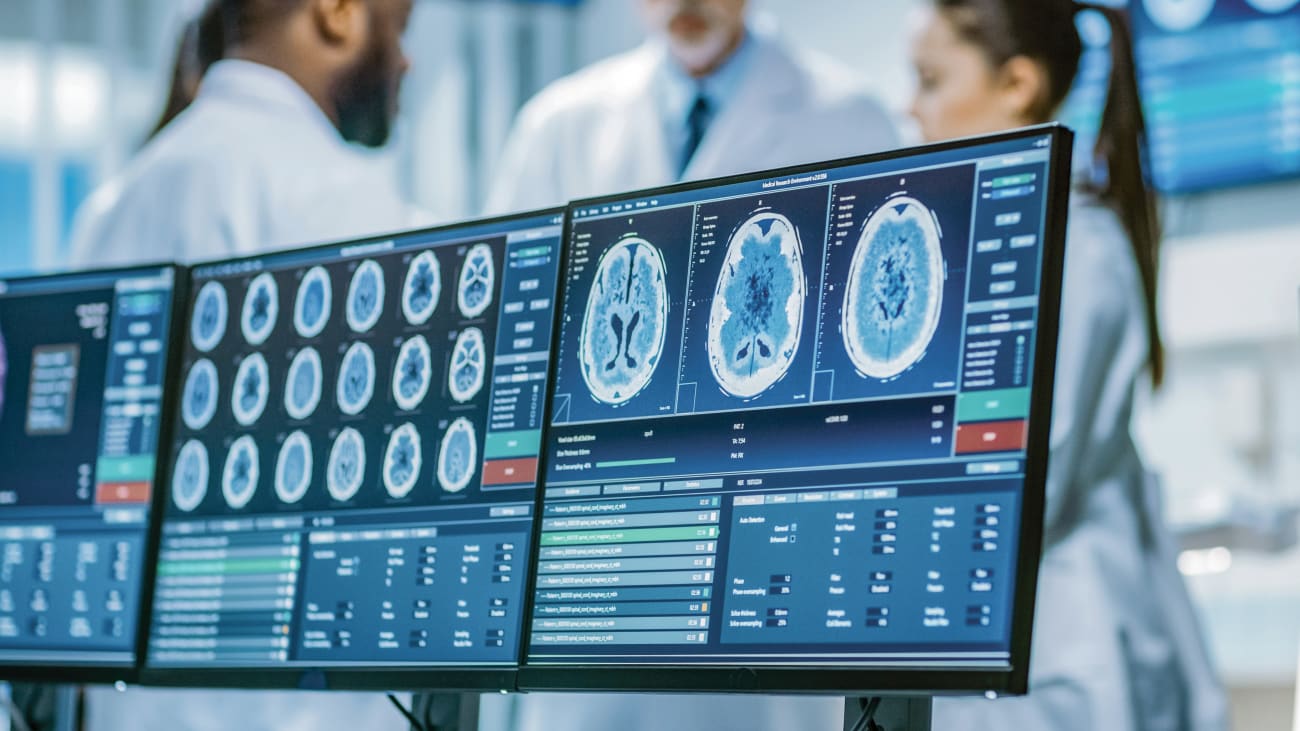

By developing new technologies and procedures that are advancing care for a host of neurological conditions, physicians at Baptist Health Miami Neuroscience Institute are enabling more patients to take advantage of treatments for debilitating and life-threatening problems.
The complexities of caring for patients with movement disorders, stroke, epilepsy and neuromuscular disorders, as well as conditions requiring neurosurgery, were the focus of the recent 12th annual Miami Neuroscience Symposium. The educational program featured neuroscience experts and physician-scientists from various institutions, as well as advanced practice providers, rehabilitation specialists, pharmacists and other clinicians.
“Neuroscience is a rapidly evolving field,” said neurosurgeon Michael McDermott, M.D., chief medical executive of the Institute and co-director of the meeting planning committee. “This symposium brings together a wide variety of speakers to allow us to learn from each other and helps us stay abreast of changes so that we provide the best care for our patients.”
According to a study published in The Lancet Neurology, neurological conditions were the leading cause of disability worldwide in 2021, with 3.4 billion people, or nearly one in three, having a neurological problem. Another study, published in JAMA Neurology, revealed that In the U.S., the most common neurological disorders between 1990 and 2017 were tension-type headaches (affecting 121.6 million people), migraines (68.5 million), stroke (7.8 million), Alzheimer’s disease and other dementias (2.9 million) and spinal cord injury (2.2 million).
(Watch now: The complexities of caring for patients with movement disorders, stroke, epilepsy and neuromuscular disorders, as well as conditions requiring neurosurgery, were the focus of the recent 12th annual Miami Neuroscience Symposium. The educational program featured neuroscience experts and physician-scientists from various institutions, as well as advanced practice providers, rehabilitation specialists, pharmacists and other clinicians.)
Symposium keynote speaker Douglas Kondziolka, M.D., M.Sc., professor of neurosurgery and radiation oncology at NYU Langone Health System, provided an overview of the use of artificial intelligence (AI) in medicine. While still in its infancy, AI is key to unlocking a greater understanding of many diseases, he believes.
Dr. McDermott agreed that AI enables many more data points to be collected and analyzed for each patient, giving it the potential to better predict what treatment might be best for a particular patient and personalizing care even further.
“AI has the potential to revolutionize neuroscience,” Dr. McDermott said. “But there are some things it will never do. The interaction between a patient and a physician or nurse is complex. You will never be able to get that with a robot or with AI.”
Among the subjects presented by Institute physicians were:
- Movement disorders — “Deep Dive into Surgical Management for Parkinson’s Disease” by Justin Sporrer, M.D., and “Management of Cervical Dystonia” by Samer Tabbal, M.D.
- Stroke care — “Brain Watching: How Neuro Ophthalmology Boosts the Stroke Program” by Maria Vera-Silva, M.D., and “PFO Closure for Stroke Prevention” by Nish Patel, M.D.
- Epilepsy — “Epilepsy: To Operate or Not to Operate” by Carlos Millan, M.D.
- Alzheimer’s disease — “Alzheimer’s Disease: Current Medical RX” by G. Peter Gliebus, M.D., and “Alzheimer’s Disease: Role of LIFU” by Michael McDermott, M.D.
- Rehabilitation and Neurological Disorders — “Rehabilitation of Traumatic Brain Injury and Spasticity Management” by Natalia Miranda-Cantellops, M.D., and “Motor Neuron Disease Rehabilitation” by Richard Morgan, D.O.
- Neurosurgery — “Modern-Day MX for Chiari” by Robert Wicks, M.D., and “Modern Day MX for Trigeminal Neuralgia” by Vitaly Siomin, M.D.
- Neuromuscular disorders/Neuro-Immunology — “Clinical Presentations of MOGAD” by Luis Andres Compres Brugal, M.D., and “Case Presentation: Neuromyelitis Optica” by Maria Vera-Silva, M.D.
- Stroke/Neuroendovascular — “Advancing the Treatment of Acute Stroke” by Italo Linfante, M.D., “Advances in the Endovascular Treatment of Cerebral Aneurysms” by Guilherme Dabus, M.D., “Middle Meningeal Artery Embolization for Chronic Subdural Hematoma” by Robert Wicks, M.D., and “EC-IC Bypass – Dead or Alive?” by Warren Selman, M.D.
“Early identification and accurate diagnosis are key to providing the best possible care and treatment for patients with neurological and neuroscience-related disorders,” said Diego Torres-Russotto, M.D., chair of neurology and chief of movement disorders for Miami Neuroscience Institute and co-director of the symposium planning committee. “Our comprehensive program ensures that attendees receive in-depth information about various neurological diseases.”
“As people live longer and the incidence of neurological problems increases, programs such as this are not only timely but vital for the growing numbers of healthcare providers involved in a patient’s care,” said Ronald Tolchin, D.O., chair of nonsurgical spine care and rehabilitation for the Institute and co-director of the meeting planning committee.
More than 200 people, including neurologists and neurosurgeons, neuroradiologists, diagnostic radiologists, critical care physicians, emergency medicine physicians, physical medicine and rehabilitation physicians, interventional neuroradiologists, neuropsychologists and pain management specialists, attended the symposium.
Watch for information on the 13th annual Miami Neuroscience Symposium and other Baptist Health Continuing Medical Education programs here.

